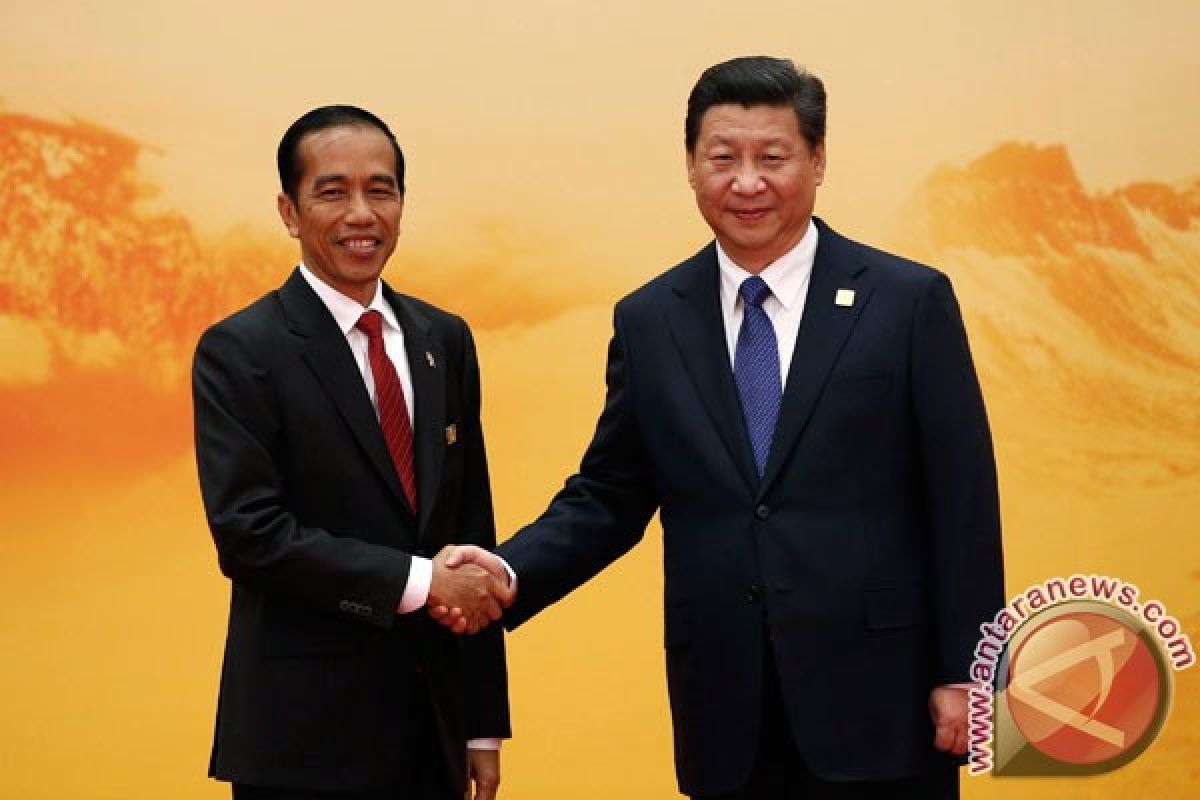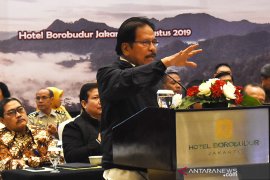Indonesia is a large country and has a large population."Jakarta (ANTARA News) - China has considered Indonesia to be a good friend, good neighbor, and good partner (3Gs) that plays a strong role in the region.
China, one of the worlds economic engines, hoped that Indonesia will become its largest trade partner in the Southeast Asian region, moving up from its fourth rank after Malaysia, Singapore, and Thailand, Chinas Vice Minister of Foreign Affairs, Fu Ying, informed Indonesian journalists in Beijing, in 2012.
Indeed, since the two nations declared a strategic partnership in Jakarta in 2005, China and Indonesia have been witnessing rapid growth in bilateral trade and economic ties.
The commitment was reaffirmed during the first high-level economic dialog between the two countries held in Beijing, on January 26, 2015, which is expected to serve as a forum to further strengthen economic relations between the two nations.
During the dialog, the Indonesian delegation led by Coordinating Minister for Economic Affairs Sofyan Djalil and the Chinese delegation headed by State Council Yang Jiechi, agreed to strengthen economic ties by intensifying sustainable trade and investment in infrastructure, energy, and financial sectors.
The dialog was initiated by then Indonesian president Susilo Bambang Yudhoyono and Chinese President Xi Jinping when the Chinese leader visited Indonesia in October 2013.
"President Joko Widodo and President Xi Jinping followed up on the initiative of the high-level economic dialog between Indonesia and China at a meeting held on the sidelines of the APEC Summit (in Beijing). At that time, the two state leaders agreed to expand relations and cooperation in various fields within the framework of comprehensive strategic partnership," Sofyan Djalil remarked.
He pointed out that China is a very important strategic partner of Indonesia. The two nations also signed a memorandum of understanding (MoU) on optimizing the development of coal-fired power plants.
In the economic field, to strengthen the strategic partnership, both countries have signed several cooperation agreements to carry out development programs during the next five years, including integrated industrial estates, financial cooperation, and development financing.
Yang Jiechi stated that during the dialog, both countries also agreed to enhance cooperation in the agricultural and fisheries sectors.
"Indonesia is a large country and has a large population. It sees improving economic performance all the time and is a G20 member, making it a very strategic partner for China," he noted.
"With the long-term relationship that we have had, Indonesia and China can continue to boost cooperation in the interests of the people of both nations, the other regions, and the international community," Yang remarked.
The economic cooperation between China and Indonesia has shown a positive trend of around 19.58 percent over the past five years between 2009 and 2013.
Since the implementation of the ASEAN-China Free Trade Area, China has enjoyed a trade surplus in its economic ties with Indonesia.
In the industrial sector, Indonesia has suffered a deficit amounting to US$16.7 billion during the period between 2009 and 2013, with the highest recorded at US$6.3 billion in 2012, and later, it decreased to US$5.5 billion.
In the trade sector, the value of bilateral trade between Indonesian and China in 2013 was recorded at US$52.4 billion, comprising Indonesias exports worth US$22.6 billion and its imports from China amounting to US$29.8 billion.
During the January-October 2014 period, Indonesias exports to China reached US$14.6 billion and its imports were recorded at US$25.0 billion, with the total two-way trade valued at US$39.7 billion.
In the investment field, in the first nine months of 2014, Chinese investments in Indonesia reached US$328 million with 435 projects, thereby placing China in the 12th position in the list of major investing countries in Indonesia.
In 2013, the realization of Chinese investment in Indonesia was recorded at US$296.8 million with 411 projects.
Sofyan Djalil earlier invited Chinese investors to join Indonesias development programs such as boosting electricity generation capacity and the constructions of toll roads, seaports, integrated industrial zones, and railway lines.
"China is the worlds second-largest country with rapid economic growth. Besides this, China is also technologically advanced. Therefore, we want China to help Indonesia build infrastructure," the chief minister stated during a seminar on "Indonesia, China and the Pacific Rim Relationship" recently.
Although the government has saved Rp230 trillion by converting unproductive subsidy to productive ones, the funds would not be sufficient for the construction of much-needed infrastructure to help boost Indonesias economic growth at seven percent, he stated.
Indonesia needs investors to help realize the target of increasing its power generation capacity to reach 35 thousand megawatts as set by President Joko Widodo.
The country also plans to build railway lines in Sumatra Province, double-track railway lines on Java Island, toll roads, and carry out the expansion of airports.
The government is also preparing an integrated one-door service to help investors applying for licenses.
While in Beijing, Minister Djalil also paid a courtesy visit to Chinese Prime Minister Li Keqiang at the Great Hall of the People, on Jan. 27.
During the meeting, the chief minister was accompanied by Indonesian Ambassador to China and Mongolia Soegeng Rahardjo, North Sulawesi Governor Sarundajang, and the deputy ministers of economic and foreign affairs.
Industry Minister Saleh Husin, who also joined the dialog in Beijing, said he was optimistic that the Indonesian economy will perform well this year despite a slowdown in the Chinese economy over the past several years.
"I remain optimistic that foreign investment, including that from China, would continue to flow into Indonesia," Saleh stated.
Based on the countrys mid-term development plan (2015-2019), Indonesias economic growth target is set at 6-7 percent a year.
In order to meet the target, a total investment of Rp26,557.9 trillion would be needed in the next five years until 2019, he noted, adding that the funds would be raised domestically and externally.
He said China is expected to assist in funding the investment, especially for infrastructure, integrated industrial estates, and other projects.
Indonesia and China have agreed to cooperate in the development of the integrated industrial estate (KIT) through an agreement signed on Oct. 2 in 2013.
Saleh Husin said Indonesia has urged Chinese investors to be serious in meeting the commitment to build 13 units of KIT.
The KITs to be developed are Kuala Tanjung (North Sumatra), Sei Mangkei (North Sumatra), Tanggamus (Lampung), Batulicin (South Kalimantan), Ketapang (West Kalimantan), Mandor (West Kalimantan), Bitung (North Sulawesi), Palu (Central Sulawesi), Morowali (Central Sulawesi), Konawe (Southeast Sulawesi), Bantaeng (South Sulawesi), Buli (East Halmahera, North Maluku), and Teluk Bintuni (West Papua).
Development of the 13 KIT units, all located outside Java, will cost around Rp55.4 trillion.
The funds will be required to build supporting infrastructure outside KITs such as ports and additional investment of Rp1.1 trillion for facilities inside KITs.
Husin said the government is committed to simplify regulations to attract investors, and the policy has contributed to stronger inflows of foreign investment including from China into the country.
He said despite the slowdown, China will still need the supply of primary commodities, such as minerals, from Indonesia.
In the tourism sector, almost one million Chinese tourists visited Indonesia last year, and for this year, Indonesia has set a target to double the number of Chinese visitors to two million.
China is currently the fourth-largest source of tourism for Indonesia, by contributing a total of 883,725 Chinese tourists between January and November 2014.
"If our expectation in 2014 was to receive one million Chinese tourists, we are optimistic that the number of Chinese tourists visiting Indonesia will reach two million by the end of 2015," Indonesian Tourism Minister Arief Yahya stated recently.
(T.F001/INE/KR-BSR/A014)
Reporter: Fardah
Editor: Priyambodo RH
Copyright © ANTARA 2015











